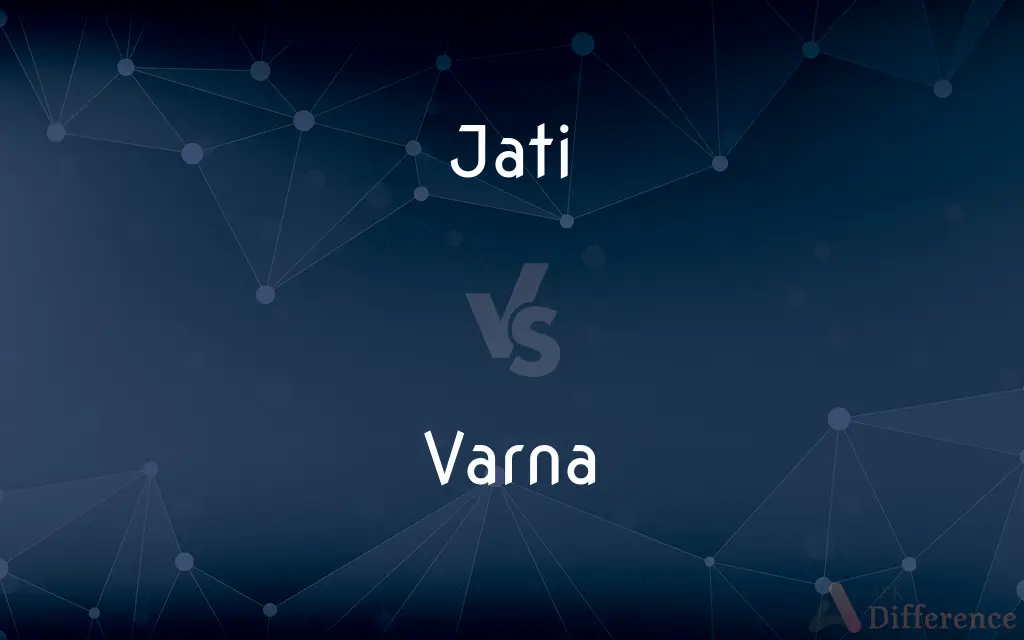Jati vs. Varna — What's the Difference?
By Tayyaba Rehman — Updated on October 30, 2023
Jati refers to specific, often local, occupational groups, while Varna is a broader categorization based on Hindu social hierarchy.

Difference Between Jati and Varna
Table of Contents
ADVERTISEMENT
Key Differences
Jati denotes specific, localized groups often tied to particular professions or trades, while Varna is a more overarching classification system, dividing Hindu society into four broad categories based on ancient texts.
Jati systems are more fluid and numerous, varying greatly across regions and communities, with members sharing common customs and occupations. In contrast, Varna is more rigid, with a foundational basis in Hindu religious texts, categorizing people into priests, warriors, traders, and laborers.
Varna carries a more religious and scriptural connotation, deeply entrenched in Hinduism's cosmology and social philosophy, whereas Jati is more sociological, reflecting real-world social structures and occupational divisions.
The concept of Varna is tied to the idea of dharma and one's role in society, dictating life's duties and responsibilities. Conversely, Jati is more about practical social organization, governing everyday interactions, marriages, and communal functions.
Jati and Varna intersect but are not synonymous; a single Varna can encompass numerous Jatis, showing the more detailed and localized nature of Jati compared to the broad and ideological nature of Varna.
ADVERTISEMENT
Comparison Chart
Definition
Localized social groups, often occupation-based.
Broad, scriptural social categories in Hindu society.
Flexibility
More fluid, varies by region and community.
More rigid and tied to religious doctrine.
Number
Numerous, with many specific Jatis.
Four main categories.
Basis
Sociological, based on occupation and social function.
Religious and scriptural, tied to Hindu cosmology.
Role in Society
Governs practical aspects like marriage, work.
Dictates broader duties and responsibilities (dharma).
Compare with Definitions
Jati
Occupational Group
The carpenters in our town form a distinct Jati.
Varna
Caste System Layer
Varna divides society into broad groups.
Jati
Local Social Cluster
Our village's fishing Jati has unique customs.
Varna
Hindu Social Class
As a Brahmin, he belongs to the priestly Varna.
Jati
Cultural Identity
The Jati she belongs to celebrates unique festivals.
Varna
Scriptural Division
Varna is mentioned in ancient Hindu texts.
Jati
Caste Subdivision
His Jati is known for skilled pottery making.
Varna
Duty-Based Category
Warriors are part of the Kshatriya Varna.
Jati
Hereditary Group
Their Jati has been weaving for generations.
Varna
Spiritual Hierarchy
His teachings focus on the duties of each Varna.
Jati
A clan, tribe, or community in India
Varna
(Hinduism) any of the four original castes in Hinduism, or the system of such castes
Jati
(music) A rhythm pattern in Indian music
Varna
(Hinduism) the name for the original social division of Vedic people into four groups (which are subdivided into thousands of jatis)
Jati
(Hinduism) a Hindu caste or distinctive social group of which there are thousands throughout India; a special characteristic is often the exclusive occupation of its male members (such as barber or potter)
Common Curiosities
What is Varna?
Varna is a broader categorization in Hinduism, dividing society into four primary classes based on ancient texts.
How many Varnas are there?
Brahmin (priests), Kshatriya (warriors), Vaishya (traders), and Shudra (laborers).
Does Jati play a role in marriages?
Traditionally, marriages often occur within the same Jati.
Can Jatis intersect with Varnas?
Yes, multiple Jatis can fall under a single Varna, reflecting the more specific nature of Jatis.
How do Jati and Varna differ?
Jati is more localized and occupation-based, while Varna is a broader, religiously defined social categorization.
Are Varnas relevant in modern India?
While legally abolished, Varna concepts still influence some aspects of society.
Are Varnas mentioned in religious texts?
Yes, Varnas are rooted in Hindu religious texts like the Vedas.
What is Jati?
Jati refers to specific, localized groups, often related to particular occupations or trades within Hindu society.
How does Jati affect daily life?
Jati can influence one's occupation, social interactions, and communal practices.
What is the purpose of Varna?
Varna is meant to organize society and assign duties based on spiritual principles.
Is Jati hereditary?
Traditionally, yes. Jatis are often passed down through generations.
Can someone change their Jati or Varna?
Traditionally, both are considered hereditary and fixed, but modern perspectives vary.
Do all Hindus follow the Jati system?
Not necessarily. Practices vary widely across regions and communities.
Has the role of Jati and Varna changed over time?
Yes, both concepts have evolved and their influence has varied throughout history and modernity.
Is the Jati system unique to Hinduism?
While prominent in Hinduism, similar concepts exist in other cultures.
Share Your Discovery

Previous Comparison
Facebook vs. Yahoo
Next Comparison
Radiator vs. ConvectorAuthor Spotlight
Written by
Tayyaba RehmanTayyaba Rehman is a distinguished writer, currently serving as a primary contributor to askdifference.com. As a researcher in semantics and etymology, Tayyaba's passion for the complexity of languages and their distinctions has found a perfect home on the platform. Tayyaba delves into the intricacies of language, distinguishing between commonly confused words and phrases, thereby providing clarity for readers worldwide.
















































